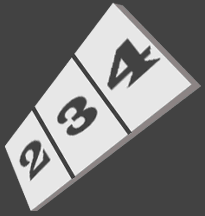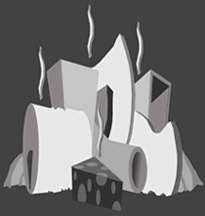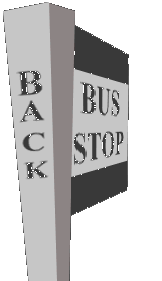|
|
Think of London, a small city. It's dark in the daytime. People sleep, sleep in the daytime if they want to, if they want to. (David Byrne, Talking Heads) I am reminded of these lyrics as I raise my head from a coarse pillow that alone knows the content of my dreams. I am Scottish. I live in Australia, and am trapped in London awaiting a stamp in my passport that will allow me to return home. My funds have all but been exhausted on a whirlwind trip that has left my mind dizzy with exchange rates, currencies, por favors and per favores.
|
|
London is a cold hard slap in the face. Everything from the pound coin to the endless queue at the post office fills me with despair. There is a meagreness of spirit here, and like cold, damp weather it will eventually sink in. This is a city that will grind down even the most joyous of souls.
| |

|
I leave the confines of my rented room and buy a one pound ninety Zone 2, 3 & 4 bus pass, hail the No 3 heading in the direction of Crystal Palace, wave my ticket in the face of the driver/conductor, climb the narrow stairs and know immediately as I snuggle up to the window, hot air blowing up from a vent below me, that I am enjoying myself. A Zone 2, 3 & 4 bus pass allows me to travel anywhere in those zones until midnight. I have all the time in the world and no particular destination in mind, other than avoiding Central London. It generally doesn't bother me which side of the road I take a bus from; sometimes the allure of a number makes me choose one bus over another. It is very hard to ignore the calling of a bus whose title is 2b or 137a. Upstairs on a London bus I rise above my situation. This new perspective sharpens my senses, snippets of conversation fascinate me, street names trigger my imagination. By chance I have become a tourist once more.
|
|
As I become more and more familiar with buses and their routes I start to develop a few favourites. The No 322, a single-decker built for the more difficult routes, weaves and winds its way from Crystal Palace down through West Norwood and Herne Hill and then onto Brixton via the markets. After Brixton the bus passes through Stockwell and Vauxhall, finally coming to rest at the Elephant and Castle beneath a large pink elephant wearing a crown. The narrowness of some of the streets combined with the density of the traffic makes this route a nightmare for anyone with an eye on the clock. But it is precisely this that makes the route so hypnotic: the staccato rhythm of a throng of school children, workers heading off for the daily grind, the ebb and flow of passengers whose purpose and urgency merely wash over me before disappearing. With every bus ride, I notice that the privatisation of the London bus system has changed the nature of public transport in the city. Each bus line is leased on a yearly basis, its performance being assessed at the end of that year. This, you would think, would result in a willingness to please the public and keep the franchise. In fact what you have is a rather noticeable cowboy element, the crazed drivers wearing Walkmans, driving like maniacs and at times showing an almost malicious disdain for their passengers.
|
|

|
One morning I ask the driver why the bus hasn't been cleaned since the previous night's deluge. `Listen mate, I don't mess up the bus, it's the passengers that do that.' I ask him how he feels driving a rubbish bin on wheels. As I dismount, an elderly lady is telling him that he should be ashamed of himself. I feel for the driver. After all, he is only a small cog in a system that's slowly going out of control. With London's congestion and sheer volume of traffic, it is remarkable that buses run even remotely on time. But this doesn't concern me, for there is almost always a bus going somewhere.
|
|
The No 2b takes me along Clapham Road, heading towards Brixton, where I notice a small collection of Portuguese cafes and shops. I immediately dismount, sensing the distinct possibility that I might be in with a chance of finding a good coffee and some reasonable food. The newspapers are proclaiming that London is swinging again, that Soho has a cosmopolitan cafe society to match any in Europe. This may be the case if you like your coffee low on caffeine (with the exception of Bar Italia in Frith Street) and high in cost, consumed in a sidewalk cafe along with the obligatory fumes of the accompanying congested traffic. Plans are under way to pedestrianise Old Compton Street and its surrounding environs. In the meantime I will steer clear of the swing that apparently exists there and opt instead for this chance discovery of an area where the food and coffee are excellent and modestly priced. One morning I take the No 3 to Crystal Palace. An inspector carrying out a passenger survey approaches me:
|
|

|
`Excuse me sir, may I see your ticket?' I proudly hold out my bus pass. `Where did you board this bus?' `I'm not quite sure.' `Where will your journey end?' `I haven't decided.' He looks at me with an expression that suggests a mixture of confusion and irritability, shakes his head, and moves on to his next and hopefully more reliable subject.
text by David McClymont
|